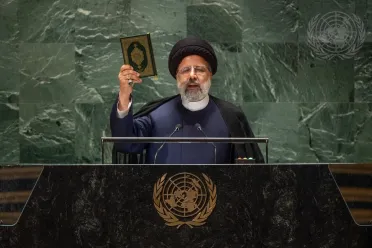Statement
Statement summary
SEYYED EBRAHIM RAISI, President of Iran, noted that the Qur’an speaks of equality among humans, encourages serving those less fortunate and forbids all forms of violence in human interaction. Holding up a copy, he underscored: “The fires of disrespect will not overcome the divine truth.” Spotlighting the Islamophobia and cultural apartheid witnessed in Western countries, he underlined the need for respect for world religions to hold a prominent place on the United Nations agenda. Further, concurrent with the war on Islam, the world is also witnessing a war against the framework of the family, which is a fundamental pillar supporting human development. He therefore called on all religious leaders to uphold their historical responsibility to defend the sanctity of the family and on the United Nations to properly protect this framework.
Noting that history is at a critical juncture, he said that Western hegemony “no longer resonates with the realities of today’s world”, that the former liberal order has been “relegated to obsolescence” and that “attempts to universalize American ideals throughout the world” have failed. Instead, there exists a collective hope for the creation of a novel, equitable world order — central to which is abandoning global arrogance in favour of regional cooperation. Further, the formation of East-West divides should not be permitted, nor should be making trade corridors unsafe, stifling the economic progress of sovereign nations or fomenting proxy wars. Noting that these actions — ironically — are conducted in the name of defending Western democracy, he said that the global community has discerned the true essence of such democracy — “nothing more than a velvet glove hiding a cast-iron hand”.
He went on to state that Iran’s good-neighbour policy seeks to increase regional cooperation and forbid external meddling “from the Caucasus to the Persian Gulf”. Any foreign presence is not part of the solution — rather, it is the problem itself. Stressing that the most serious threats in Western Asia are extremism and fundamentalism, he said that the surgical use of terrorists by Western Governments will be overcome by the collective will of the people of the region. “Discrimination in the fight against terrorism is a green light given to the terrorists themselves,” he emphasized. Turning to Palestine, he asked whether “the time has come” to end 75 years of occupation, demolition and the spilling of the blood of women and children. The situation in Afghanistan is another example of foreign meddling in the region, and he called on the international community to provide the assistance necessary to address the crisis of refugees driven from that country — many of whom have been given refuge in Iran.
On Ukraine, he underscored his country’s “unambiguous position” that it does not support any war — neither in Europe nor anywhere else — and that it supports any initiative aimed towards the cessation of hostilities. Stressing that the United States’ leaving of the Joint Comprehensive Plan of Action was an “inappropriate response” to Iran’s fulfilment of its commitments within that framework, he called on Washington, D.C., to choose a path — “either JCPOA or not”. While stating that nuclear weapons have no place in Iran’s defensive or military doctrines, he nevertheless stressed that his country “will never fall short” of obtaining its inherent right to peaceful nuclear energy. He added that the United States’ use of sanctions has not yielded the desired result, calling on that country to “cease traveling on the wrong path”. Reiterating that humanity is entering a new framework, he said that while old Powers will continue their trajectory “they represent the past, and we are the future”.
Speaking at the annual debate of the UN General Assembly in New York, Iran’s President, Seyyed Ebrahim Raisi discussed the emergence of non-Western powers, encouraged regional economic and security partnerships, and lamented the ongoing Israeli occupation of Palestinian territories.
Full statement
Read the full statement, in PDF format.
Photo

Previous sessions
Access the statements from previous sessions.
